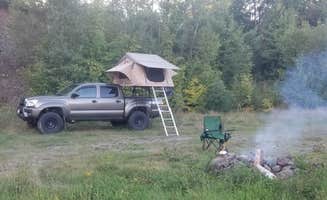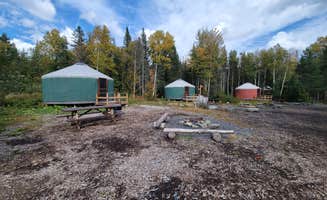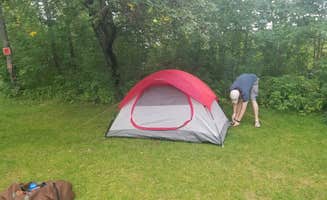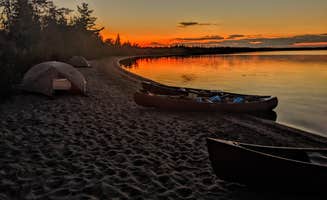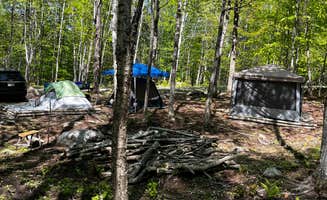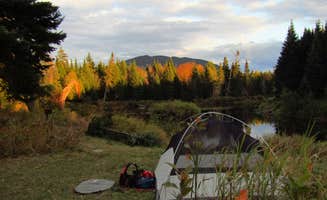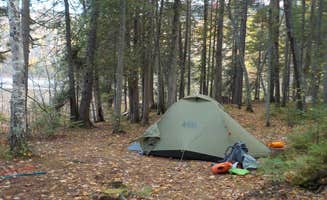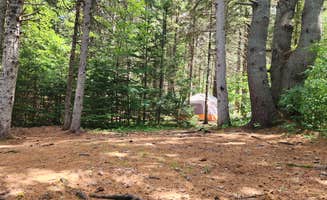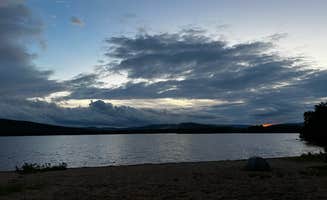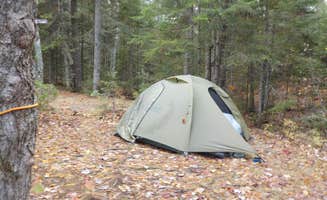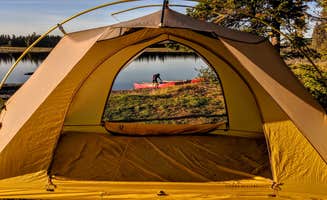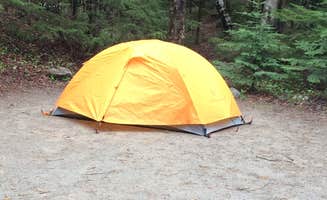Tent camping near Greenville, Maine offers multiple sites within Little Moose Public Lands where campers can experience Maine's wilderness. The elevation in this region ranges from 1,000 to 3,196 feet, creating varied terrain for hikers and campers. Winter camping is possible but requires additional preparation, as temperatures can drop below freezing from November through April.
What to do
Fishing opportunities: The ponds in Little Moose Public Lands contain native brook trout populations requiring special regulations. At Trout Pond Campsite, one camper noted, "The pond is beautiful, and you have water access from this campsite. There are some canoes and boats stashed in the woods and we saw a few people paddling and fishing while we visited."
Moose viewing: Early morning hours provide the best wildlife sightings in the region. A visitor to Rum Pond Campsite reported, "We saw massive amounts of moose droppings along the trail near Cranberry Pond and did see a large bull moose at the small pond just off to the right-hand side as you enter Rum Pond Road from Ki Road."
Hiking trails: Access multiple trail networks directly from most campsites with minimal driving required. According to a camper at Upper Gravel Pit, "The best thing about camping here is the easy access to the great hiking in Little Moose Public Lands. Great views are found along the Little Moose Pond Trail for people looking for a decent hike but not too much elevation change."
What campers like
Water access: Most primitive sites are situated along pond edges, allowing for swimming and paddling. At Little Notch Pond Campsite, a reviewer shared, "The campsite if free and available on a first-come, first-served basis. The campsite is not very large so multiple tents may not fit but it is secluded and very nice."
Seclusion: Walk-in sites provide greater privacy compared to drive-up alternatives. A camper at Little Moose Pond Campsite described, "The campsite is tucked in the woods so you get some shade and privacy. Since you are right on the water, there are great views of the pond and surrounding woodlands."
Community canoes: Several sites have shared canoes left by previous visitors. As one camper mentioned about Big Moose Pond Campsite, "The campsite farthest from the trail has lot of canoes and boats chained to trees so you can expect people to walk thru you site to access their canoes/boats."
What you should know
Toilet facilities: Rustic toilets vary considerably between sites, from enclosed vault toilets to simple frames. A visitor to Big Moose Pond Campsite explained, "There is an enclosed vault toilet located between the two sites. The campsite farthest from the trail has lot of canoes and boats chained to trees so you can expect people to walk thru you site to access their canoes/boats."
Fire permit requirements: A fire permit is mandatory for all sites and must be obtained before arrival. One reviewer stated, "You need to call 207-695-3721 to see if you can obtain a permit before starting a fire."
Trail conditions: Some access trails include wooden planks over wet areas that become slippery after rain. A camper noted, "The path to get to the campsite is relatively flat and easy to traverse except over some of the wooden planks which were slippery when I visited due to recent rain."
Tips for camping with families
Distance considerations: When camping with children, choose sites with shorter approaches. About Wilson Streams Area, a visitor shared, "The sites are considered 'walk in' but there are parking spaces adjacent to the campsites that will accommodate cars (no RVs). Sites 1, 2, 3, and 6 are right along the stream with access to the water and nice tall trees for shade."
Safer water options: For families wanting water access with supervision, select sites with gradual pond entries. One review mentioned, "There are six primitive first come, first serve campsites near the trailhead of Little Wilson Falls. As you enter the gravel road leading to the falls trailhead, there is an information board with registration instructions and rules and regulations."
Alternative lodging: For families new to primitive camping, consider yurt options. A visitor to Northeast Whitewater Lodge explained, "There are six yurts all with varying configurations, sleeping anywhere from 1-2 people (with king sized bed) up to up to six people (with bunk beds). All yurts have electricity and come equipped with heaters and fans."
Tips from RVers
Size limitations: Most primitive camping areas cannot accommodate RVs due to narrow access roads and small parking areas. A camper at Upper Gravel Pit noted, "The road to the pit is gravel and bumpy but you don't need a 4-wheel drive or high clearance vehicle. The short road up to the camping area is quite steep with somewhat loose rocks."
Alternative options: RVers should consider established campgrounds in Greenville proper rather than the primitive sites. One camper mentioned, "There are no RV/Van camping facilities. All camping is walk-in as you can't drive to your site but most campsites and yurts are not too far away."
Supply planning: No water or dump stations exist at primitive sites, requiring self-sufficiency. A visitor observed, "There are no utilities, potable water, restroom, or garbage facilities so bring the water your need and carry out your trash."


